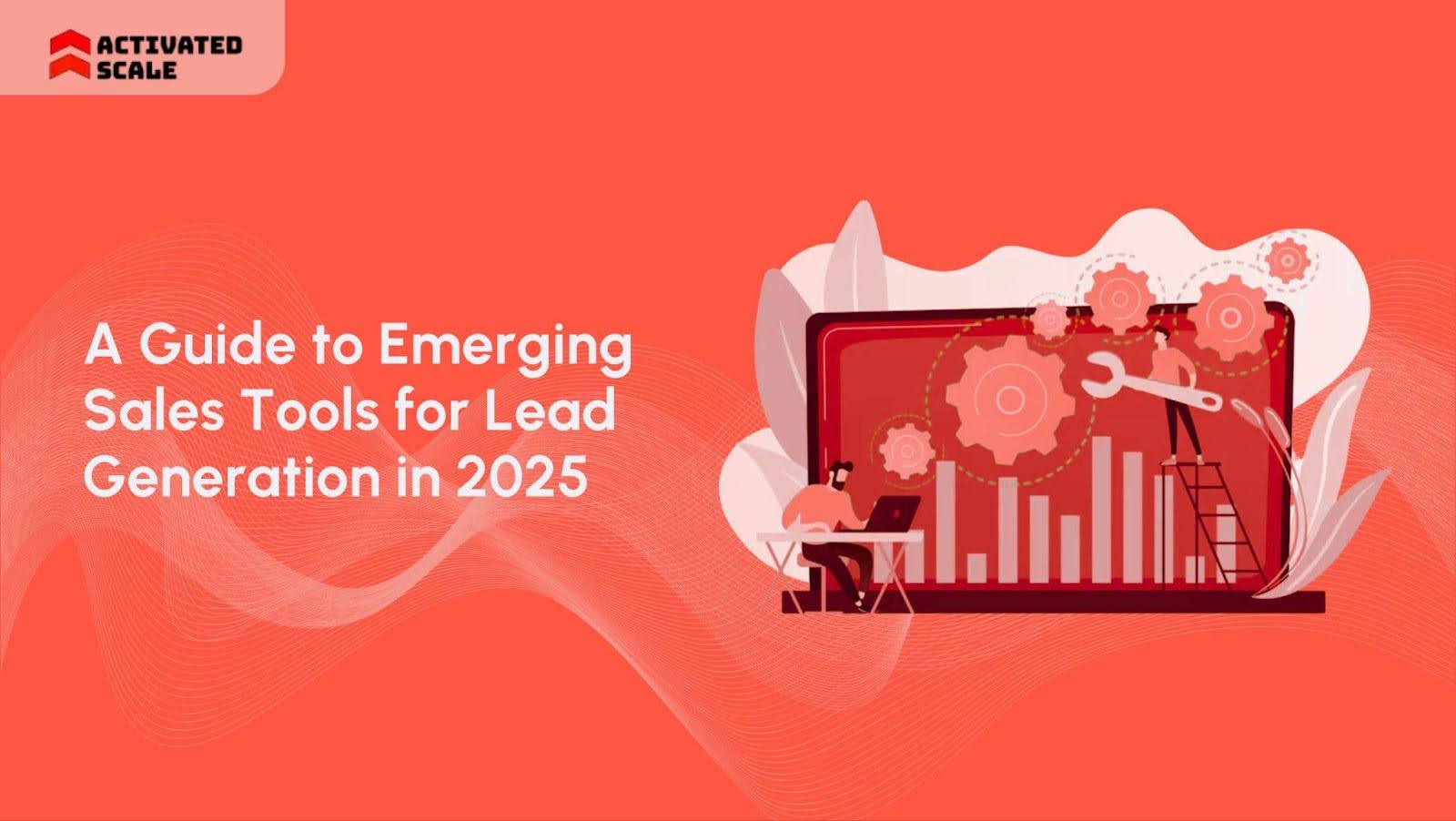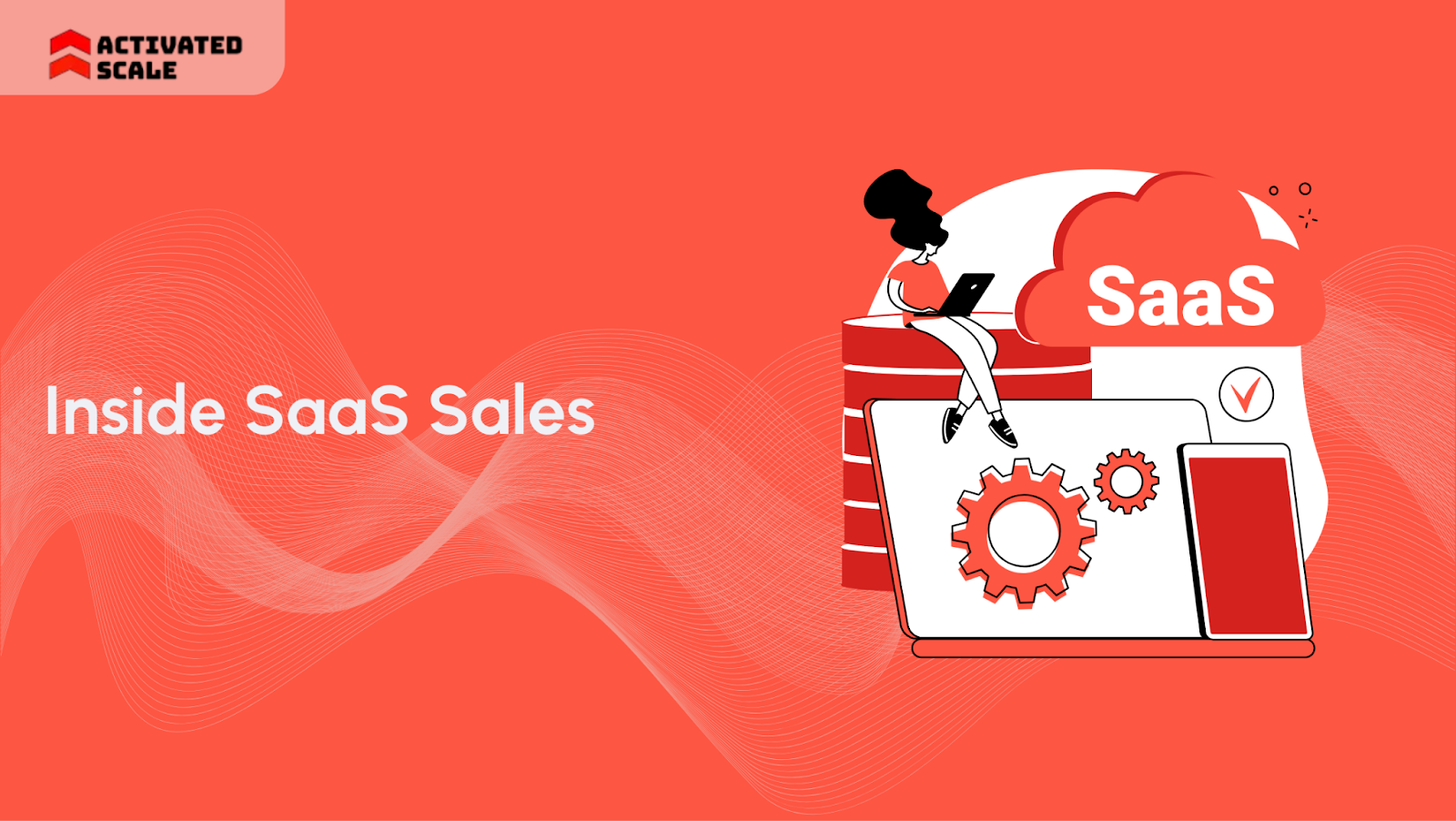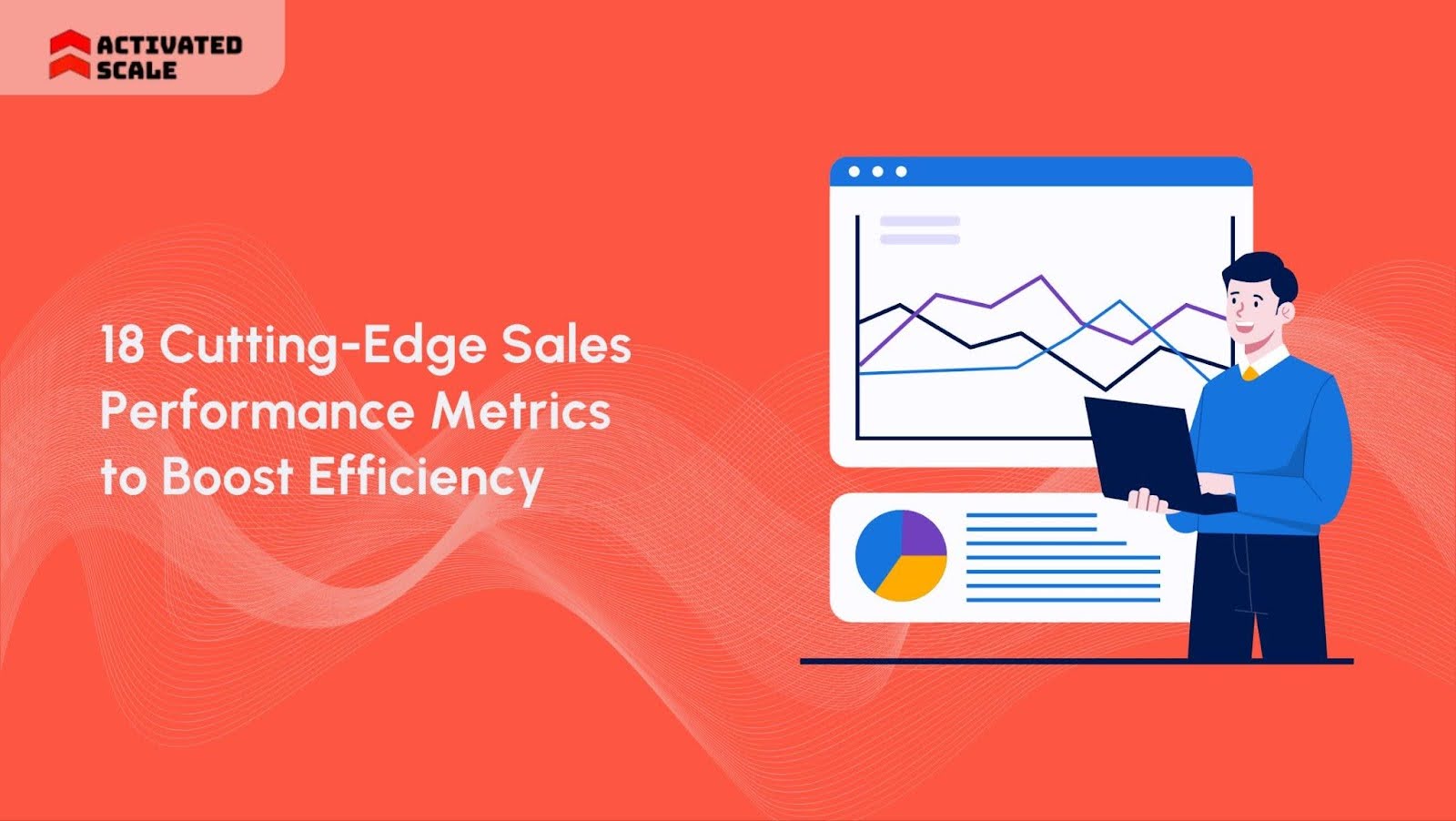Generating high-quality leads remains a top priority for over half of marketers globally, with organizations averaging nearly 1,900 leads per month. Yet, turning leads into meaningful sales conversations continues to challenge many teams.
The Shift Towards Technology-Driven Lead Generation
Recent data underscores this transformation:
- 50% of marketers identify lead generation as their top priority in marketing campaigns .
- Companies utilizing marketing automation experience up to a 451% increase in qualified leads .
- Despite the rise of digital tools, email marketing remains a cornerstone, with 42% of businesses considering it the most effective lead generation method .
These statistics highlight a pivotal shift: the integration of advanced tools is no longer optional but essential for effective lead generation.
This guide offers a focused exploration of the emerging sales technologies reshaping lead generation today.
In a Nutshell
- Emerging sales tools in 2025 use AI and automation to find and convert better leads faster.
- Key tool types include visitor tracking, AI outreach, marketing automation, chatbots, and multi-channel platforms.
- Selecting tools depends on business goals, integration ease, and team adoption for maximum impact.
- Activated Scale offers expert sales support to help implement these tools effectively.
What Are Lead Generation Tools?
Lead generation tools are specialized software and platforms designed to help businesses identify, capture, and nurture potential customers throughout the sales funnel.
Unlike traditional tools, emerging sales tools for lead generation in 2025 have advanced technologies like artificial intelligence (AI) and real-time data analytics.
These innovations, along with multi-channel automation, deliver smarter, faster, and more personalized lead generation outcomes.
Key Functions of Emerging Lead Generation Tools Include:

- Visitor and Lead Identification: Recognizing anonymous website visitors or prospective buyers early using cookies, IP tracking, and third-party data to reveal potential leads.
- Automated Outreach: AI-driven cold emailing, chatbots, and multi-channel messaging that tailor communication based on behavior, increasing response rates.
- Lead Scoring and Qualification: Using predictive analytics to rank leads by their likelihood to convert, helping sales teams focus efforts effectively.
- Data Enrichment: Supplementing basic lead info with firmographics, contact details, and engagement history to build detailed prospect profiles.
- Workflow Automation: Connecting various tools, like CRMs, email platforms, and ad networks, to create seamless lead capture, nurturing, and handoff processes.
Also Read: Trends in Lead Generation Outsourcing for 2025
Emerging Sales Tools for Lead Generation in 2025
In 2025, lead generation is being reshaped by a new wave of emerging sales tools that blend advanced technologies like artificial intelligence, automation, and multi-channel engagement.
These tools empower sales and marketing teams to nurture and convert leads with greater precision and efficiency.
Here’s a summary table highlighting the key categories of emerging sales tools for lead generation, along with representative platforms, core functions, and who they’re best suited for.
Also Read: Understanding the Difference: Lead Generation vs Conversion
Lead Identification & Website Visitor Tracking
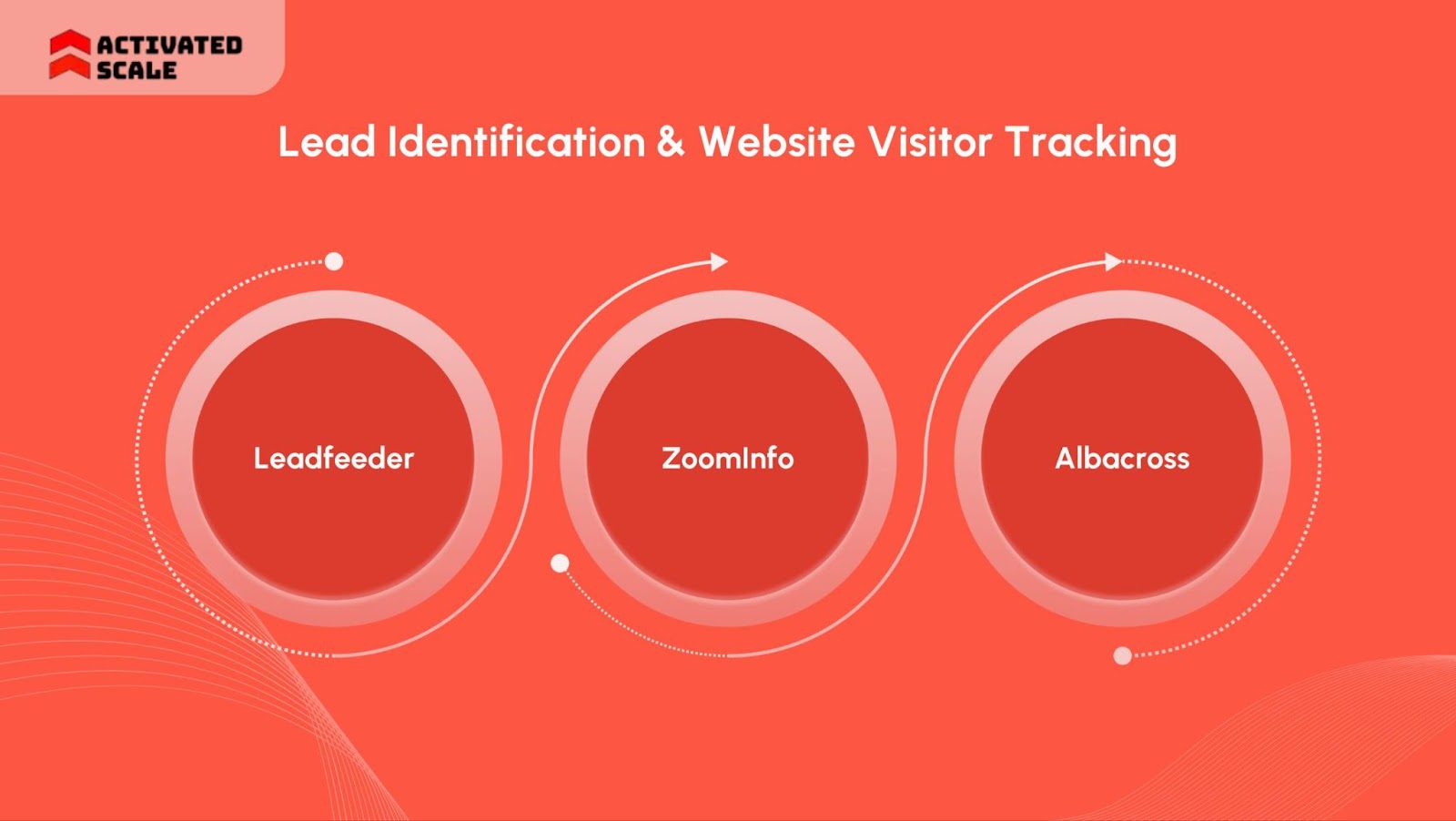
Lead identification and website visitor tracking tools are crucial elements of emerging sales tools for lead generation in 2025.
They transform anonymous website traffic into actionable business leads by identifying the companies visiting your site, enriching their profiles, and helping prioritize outreach.
Here’s a closer look at three leading solutions in this category:
1. Leadfeeder
Leadfeeder specializes in turning anonymous website visitors into actionable leads by identifying the companies behind the visits.
Beyond basic identification, it offers lead scoring to prioritize prospects based on firmographics and engagement, integrations with a wide range of CRMs (such as Salesforce, HubSpot, Zoho), and real-time custom alerts.
Key features:
- Company-level visitor identification
- Lead scoring based on behavior and firmographics
- Extensive CRM and marketing automation integrations
- Custom alert notifications and in-depth visitor analytics
2. ZoomInfo
ZoomInfo offers a comprehensive B2B contact database combined with real-time chat and visitor identification capabilities.
It enriches visitor data with detailed contact information, firmographics, and engagement history, synced directly with major CRMs.
ZoomInfo is particularly valued for its breadth of data across industries and use cases, making it a strong tool for extensive prospecting and enriching lead profiles discovered via website visits.
Key features:
- Vast B2B contact and company database
- Real-time website visitor identification plus chat functionality
- Detailed contact and firmographic enrichment
- CRM sync for seamless lead management
3. Albacross
Albacross focuses on identifying and qualifying leads visiting your website by capturing company data and user intent signals.
It includes AI-powered lead insights and buyer persona recommendations to help segment and prioritize leads.
Though it provides visitor history for up to 90 days (longer than many competitors), its contact enrichment features are limited to higher-tier plans.
Key features:
- Anonymous visitor company identification
- AI-driven lead scoring and buyer persona insights
- Integration with CMS platforms and popular CRMs
- Extended visitor history tracking (up to 90 days)
AI-Powered Outreach & Cold Email Tools
AI-powered outreach and cold email tools have become essential in the arsenal of emerging sales tools for lead generation in 2025.
They combine artificial intelligence with automation to craft personalized emails, schedule optimal send times, and intelligently prioritize replies, helping sales teams scale outreach without sacrificing quality or relevance.
1. Saleshandy
Saleshandy offers AI-driven cold email outreach designed to simplify campaign management and boost engagement.
Its standout feature is AI-based reply categorization, which automatically sorts inbound responses into actionable buckets like Interested, Not Interested, Meeting Booked, and Deal Closed.
Key features:
- AI Sequence Builder: Easily creates multi-step email sequences that automatically trigger follow-ups based on recipient behavior.
- Lead Finder Database: Access to over 700 million contacts and 60 million companies to build accurate prospect lists.
- Real-time Email Verification: Reduces bounce rates and protects sender reputation.
- Integrations: Works smoothly with CRMs such as HubSpot, Zoho, and Salesforce.
- Affordable for startups with scalable plans.
2. Hunter
Hunter specializes in email finding and verification, critical for building accurate and trusted prospect lists before cold outreach. When you simplify and validate contact discovery, Hunter helps reduce bounce rates and ensures your cold emails reach real decision-makers.
Key features:
- Email Finder: Quickly find email addresses by entering a domain or individual name.
- Verifier: Confirms the deliverability of emails to avoid spam traps and bounces.
- Bulk Tasks: Allows bulk email search and verification.
- Integration: Supports multiple platforms including Gmail, Salesforce, and HubSpot.
Marketing Automation & CRM Platforms
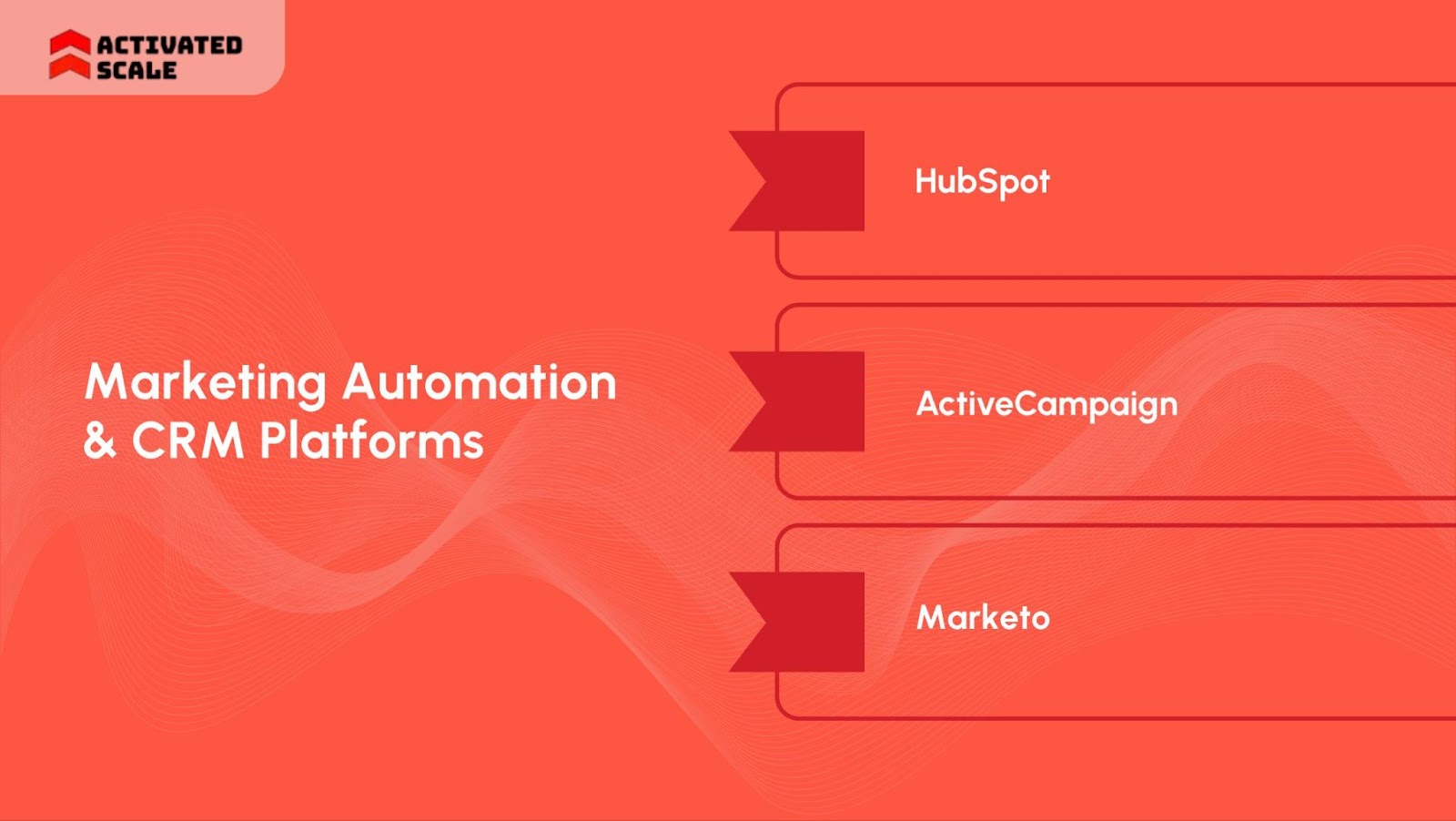
Marketing automation and CRM platforms centralize lead capture, automate nurturing workflows, and deliver personalized communications at scale to help sales and marketing teams convert prospects more efficiently.
1. HubSpot
HubSpot is a widely-used all-in-one marketing automation suite combined with a powerful CRM. It offers seamless lead capture, email marketing, landing pages, and social media management—all integrated under one platform.
HubSpot’s strength lies in its intuitive interface, flexible workflow automations for lead nurturing, and built-in AI-powered insights, making it accessible to businesses of any size.
Key features:
- Integrated CRM with marketing, sales, and service hubs
- Visual workflow builder for automated lead nurturing
- AI-powered content creation and personalization
- Extensive free tier and scalable paid plans
- Strong blogging and content management system (CMS)
2. ActiveCampaign
ActiveCampaign blends email marketing, CRM, and sales automation with a focus on advanced segmentation and personalized messaging.
Its automation capabilities include behavior tracking and dynamic content, allowing nuanced outreach tailored to prospect actions and profiles.
ActiveCampaign is especially recognized for strong email marketing performance and customer experience automation.
Key features:
- Deep segmentation and dynamic email personalization
- Visual automation builder with multi-step workflows
- Built-in CRM with lead scoring and pipeline management
- Machine learning to predict customer behavior
- Flexible integrations with popular business tools
3. Marketo
Marketo, part of Adobe Experience Cloud, is an enterprise-grade marketing automation platform known for its strong lead management, detailed analytics, and extensive customization.
It excels in multichannel campaign orchestration, account-based marketing (ABM), and predictive analytics, making it a powerful but complex choice best suited to larger organizations with dedicated marketing teams.
Key features:
- Enterprise-level lead nurturing and scoring
- AI-assisted personalized content creation
- Advanced campaign customization and segmentation
- Comprehensive analytics and reporting dashboards
- Integration with Salesforce, Microsoft Dynamics, and other CRMs
Popup & Conversion Optimization Tools
Popup and conversion optimization tools allow businesses to engage website visitors at precisely the right moment, increasing the chance of capturing qualified leads without disrupting the user experience.
These tools use tailored messaging, smart triggers, and data-driven experimentation to optimize lead capture forms and calls-to-action.
1. OptinMonster
OptinMonster is a versatile lead capture platform designed to convert abandoning visitors with sophisticated popup forms and other types of onsite messaging. Its standout features include:
- Exit-Intent® Technology: Detects when users are about to leave the site and triggers targeted popups to retain them.
- Advanced Targeting: Personalize campaigns by user location, device, referral source, new vs returning visitors, and page-level targeting.
- A/B and Multi-Page Testing: Test headlines, images, calls-to-action, and forms across multiple pages to discover the highest-converting variations.
- MonsterLeads™: Built-in lead management dashboard to view and manage collected leads without separate integrations.
- Integrations: Connects seamlessly with major CRM and email platforms like HubSpot, Salesforce, Mailchimp, and more.
2. Wisepops
Wisepops focuses on personalized onsite messaging to engage visitors proactively. Its key capabilities include:
- Dynamic Segmentation: Deliver tailored campaigns based on visitor behavior, demographics, and interactions.
- Multi-Channel Campaign Triggers: Link campaign displays to various user actions and external sources for consistent messaging.
- Advanced Experimentation: Run A/B and multivariate tests to optimize popup timing, design, and content.
- Real-Time Analytics: Monitor performance and visitor engagement to refine campaigns continuously.
AI Chatbots & Conversational Marketing
AI chatbots and conversational marketing platforms represent another vital category of emerging sales tools for lead generation in 2025 by providing real-time personalized engagement and instant lead qualification on websites.
1. Drift
Drift specializes in real-time conversational marketing through intelligent chatbots designed to:
- Engage site visitors instantly to answer questions and guide them through the buying journey.
- Qualify leads live by gathering relevant information before handing off to sales teams.
- Schedule meetings and automate follow-up sequences using AI-driven workflows.
- Integrate with CRM systems to sync conversations and lead data seamlessly.
Its focus on conversational experiences helps businesses increase engagement rates, reduce response time, and convert more visitors into qualified leads.
2. Intercom
Intercom offers a comprehensive customer messaging platform combining chatbots and live chat tools, providing:
- Automated lead capture with customizable bot flows that collect contact details and qualify prospects.
- Personalized messaging triggered by visitor behavior, location, and historical data.
- Rich CRM features to manage customer interactions and nurture leads inside the platform.
- Integration with sales and marketing tools, enabling continuous conversation across channels.
Data Enrichment & Prospecting Tools
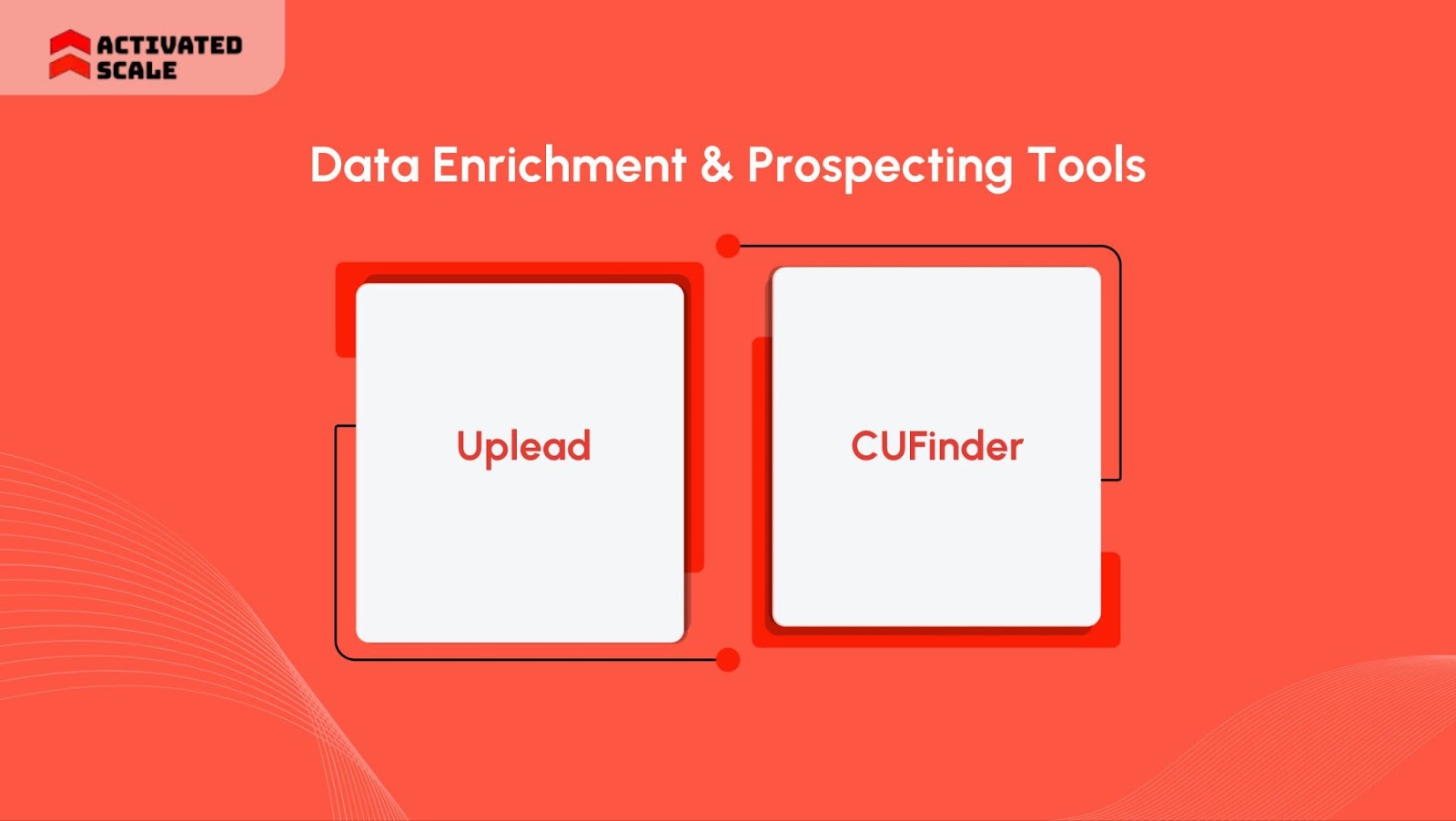
Data enrichment and prospecting tools are crucial components within emerging sales tools for lead generation in 2025. They enhance basic lead information by appending valuable firmographic, technographic, and contact details, allowing sales teams to better segment, prioritize, and engage prospects.
1. UpLead
UpLead is a B2B contact database emphasizing data accuracy with verified emails and direct dial phone numbers.
It offers real-time data enrichment, allowing users to build targeted prospect lists based on filters like industry, company size, technology stack, and job titles.
UpLead’s verification system reduces bounce rates and improves delivery for outbound campaigns.
The platform integrates with popular CRMs (HubSpot, Salesforce, Pipedrive) and marketing tools, streamlining enriched data flow directly into existing workflows.
Key features:
- Verified and accurate contact information (email & phone)
- Advanced filtering for precise prospect targeting
- Real-time enrichment and lead scoring
- CRM and marketing automation integrations
- Responsive customer support and flexible pricing tiers
2. CUFinder
CUFinder employs AI-driven technology to enrich and generate leads from a global, expansive database. It combines multiple data sources, offering detailed firmographic and technographic profiles, intent signals, and contact data.
CUFinder supports deeper insights through AI-powered lead scoring and segmentation, helping sales teams prioritize leads with the highest conversion potential.
Key features:
- AI-powered enrichment with predictive lead scoring
- Comprehensive global B2B data coverage
- Intent signals and buyer persona insights
- Integration with CRM and marketing platforms via API
- Scalable plans suitable for mid-market to enterprise
Multi-Channel Sales Engagement Platforms
Multi-channel sales engagement platforms unify outreach across email, phone calls, social media, and other channels, enabling coordinated, persistent engagement with prospects.
Automation capabilities drive cadence execution, analytics provide performance tracking, and integrations keep lead data synchronized for sales efficiency.
1. Overloop
Overloop combines email, calling, and social outreach into a single platform designed for streamlined sales engagement.
It offers multi-step cadence automation that guides prospects through personalized outreach sequences across channels.
Overloop supports CRM integration with HubSpot, Pipedrive, and Salesforce, ensuring seamless lead data flow.
Key features:
- Unified email, call, and social outreach automation
- Multi-channel personalized cadences with triggers
- Detailed engagement analytics and pipeline reporting
- CRM synchronization for lead management
- User-friendly interface suitable for SMBs and growing teams
2. Salesloft
Salesloft is a veteran leader in multi-channel sales engagement, automating cadences that include email, phone, social touches, and SMS. Its analytics engine offers deep insights into sales activities and prospect behavior, assisting reps in prioritizing efforts.
Key features:
- Advanced multi-channel sequence automation
- In-depth analytics on engagement and pipeline health
- Integration with leading CRMs and data sources
- AI-driven activity suggestions and call coaching
- Scalable platform for large sales organizations
SMS Marketing & Meeting Scheduling
SMS marketing and meeting scheduling tools enable swift, direct communication with prospects. They also streamline the often time-consuming task of setting appointments, reducing friction in the sales process and improving lead qualification rates.
1. SimpleTexting
SimpleTexting is an SMS marketing platform that facilitates automated, two-way messaging campaigns to engage leads promptly and personally. It helps sales and marketing teams deliver timely texts, nurture prospects through drip sequences, and manage consent compliantly to maintain trust.
Key features:
- Automated SMS campaigns with scheduling and drip workflows
- Two-way messaging to foster real conversations and deeper engagement
- Contact segmentation and personalization capabilities
- Compliance tools to manage opt-ins/opt-outs with ease
- Reporting on delivery status, response rates, and campaign effectiveness
- Integrates with popular CRMs and marketing systems for seamless data flow
2. Calendly
Calendly simplifies the appointment booking process by automating scheduling, eliminating back-and-forth emails, and integrating seamlessly into existing calendars and CRM workflows. It helps qualify leads by easing access to meetings, demos, or consultations, accelerating the sales cycle.
Key features:
- Personalized, sharable scheduling links with automatic timezone detection
- Syncs with Google Calendar, Outlook, iCloud, and more to avoid conflicts
- Customizable meeting types, availability, and buffer times
- Automated reminders, rescheduling options, and follow-ups to reduce no-shows
- Integrates with CRMs, video conferencing tools (Zoom, Teams), and marketing platforms
- Team scheduling and round robin options for distributing inbound meetings
Also Read: Best Sales Coaching Tools for Remote Teams 2025
How Activated Scale Supports Modern Lead Generation Efforts
Emerging sales tools are powerful, but success depends on having the right sales talent and leadership to use them effectively. Activated Scale offers flexible, expert sales resources tailored to help companies maximize their lead generation capabilities.
Activated Scale’s Core Services That Support Lead Generation Success:
- Contract-to-Hire Sales Recruiting
Quickly bring on pre-vetted sales professionals skilled in modern lead gen tools and workflows. Evaluate them on the job before making a full-time commitment, reducing hiring risk while enhancing lead capture and qualification. - Fractional Selling
Access part-time or project-based sales experts who seamlessly integrate with your team. These flexible sellers are trained in using CRMs, AI automation, and multi-channel outreach, accelerating pipeline growth without full-time overhead. - Fractional Sales Leadership
Gain experienced sales leaders on a fractional basis to design, implement, and optimize your sales processes and technology stack. They guide teams in adopting emerging tools effectively to increase qualified leads and conversion rates.
Also Read: Addressing Sales Talent Gaps in Startups Today
Conclusion
Choosing the right emerging sales tools for lead generation in 2025 means aligning technology with your specific business needs. Start by defining your lead generation goals by improving lead quality, automating outreach, or better qualifying prospects.
Evaluate tools based on integration with your current CRM and marketing stack to ensure smooth workflows. Look for AI-driven personalization, real-time analytics, and multi-channel capabilities that adapt to buyer behaviors.
User-friendliness is key for adoption, and transparent, scalable pricing ensures long-term value.
Ready to take your lead generation to the next level? Book a demo call with Activated Scale for expert sales talent and leadership trained in the latest emerging sales tools.
FAQs
1. How do emerging sales tools handle data privacy and compliance?
Many modern lead generation tools embed GDPR and other data privacy compliance features by design. They offer consent management, data anonymization, opt-out tracking, and secure data storage to help businesses meet legal requirements and maintain customer trust while generating leads.
2. What are the biggest challenges when implementing new lead generation tools?
Common challenges include lack of team expertise, integration complexities with existing systems, data quality issues, and ensuring consistent usage by sales and marketing teams. Successful implementation often requires training, phased rollouts, and choosing tools known for ease of integration and strong support.
3. How important is AI in lead generation tools for 2025 and beyond?
AI is critical for delivering predictive lead scoring, hyper-personalized outreach, and automation that scales. It allows faster qualification, optimizes engagement timing, and helps sales teams focus on leads with the highest conversion potential, making AI a game changer in effective modern lead generation.
4. Can small businesses benefit from these advanced lead generation tools, or are they only for enterprises?
Many emerging sales tools provide scalable pricing and features suitable for small and medium businesses (SMBs). Startups and SMBs benefit from affordable automation, data enrichment, and CRM integrations that improve lead quality without requiring large budgets or complex setups.
5. How do multi-channel engagement platforms improve lead conversion rates?
Multi-channel platforms unify outreach across email, phone, social media, and SMS, creating consistent and persistent engagement. By automating coordinated touchpoints and tracking responses in real time, they reduce lead drop-off and accelerate movement through the sales funnel.
The Ultimate Guide to Hiring a Salesperson!
Get the step-by-step guide to hiring, onboarding, and ensuring success!
_edi.png)
